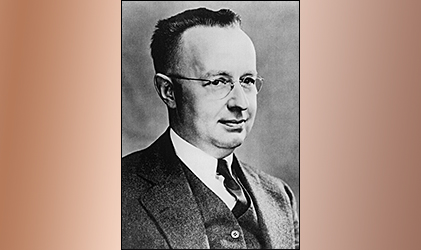- DSpace Home
- →
- W A Shewhart Collection
W A Shewhart Collection
Browse by

<html> <font color=Blue> <h4>Walter Andrew Shewhart ( March 18, 1891 – March 11, 1967) was an American physicist, engineer and statistician, sometimes known as the father of statistical quality control.<br> Bell Telephone’s engineers had been working to improve the reliability of their transmission systems. Shewhart's first assignment was to improve the voice clarity of the carbon transmitters in the company's telephone handsets. Later he applied his statistical methods to the final installation of central station switching systems, then to factory production.<br> Shewhart framed the problem in terms of assignable-cause and chance-cause variation and introduced the control chart as a tool for distinguishing between the two. Shewhart stressed that bringing a production process into a state of statistical control, where there is only chance-cause variation, and keeping it in control, is necessary to predict future output and to manage a process economically. Dr. Shewhart created the basis for the control chart and the concept of a state of statistical control by carefully designed experiments. While Dr. Shewhart drew from pure mathematical statistical theories, he understood data from physical processes never produce a "normal distribution curve". He discovered that observed variation in manufacturing data did not always behave the same way as data in nature (Brownian motion of particles). Dr. Shewhart concluded that while every process displays variation, some processes display controlled variation that is natural to the process, while others display uncontrolled variation that is not present in the process causal system at all times. <br> Shewhart worked to advance the thinking at Bell Telephone Laboratories from their foundation in 1925 until his retirement in 1956, publishing a series of papers in the Bell System Technical Journal.<br> From the late 1930s onwards, Shewhart's interests expanded out from industrial quality to wider concerns in science and statistical inference. Shewhart's approach to statistics was radically different from that of many of his contemporaries. He possessed a strong operationalist outlook, largely absorbed from the writings of pragmatist philosopher Clarence Irving Lewis, and this influenced his statistical practice. In particular, he had read Lewis' Mind and the World Order many times. Though he lectured in England in 1932 under the sponsorship of Karl Pearson (another committed operationalist) his ideas attracted little enthusiasm within the English statistical tradition. The British Standards nominally based on his work, in fact, diverge on serious philosophical and methodological issues from his practice.<br> Walter Shewhart visited India in 1947–1948 under the sponsorship of P. C. Mahalanobis of the Indian Statistical Institute. He toured the country, held conferences and stimulated interest in statistical quality control among Indian industrialists.</h4><br></Font> </html>
Collections in this community
Recent Submissions
-
(The Graduate School, Washington, 1939)
-
(D. Van Nostrand, London, 1931)
-
(Indian Statistical Institute, Kolkata, 1936-02-20)
-
(Indian Statistical Institute, Kolkata, 1935-10)
-
(Franklin Institute, 1938-08)
-
(Indian Statistical Institute, Kolkata, 1935)
-
(Indian Statistical Institute, Kolkata, 1935-11)
-
(Mechanical engineering, 1934-12)
-
(Econometrica, 1933-01)
-
(Indian Statistical Institute, Kolkata, 1964)
-
(Bell System Technical Journal, 1926-10)
-
(Indian Statistical Institute, Kolkata, 1935-12-11)
-
(Indian Statistical Institute, Kolkata, 1936-02-19)
-
(The Franklin Institute, 1928-03)
-
(Bell System Technical Journal, 1926-01)
-
(Bell System Technical Journal, 1926-04)
-
(University of Pennsylvania, 1940-09)
-
(Bell Telephone Laboratories, 1929-10)
-
(American society, 1931-06-26)
-
(Mechanical engineering, 1932-11)
-
(The Graduate School, Washington, 1939)
-
(D. Van Nostrand, London, 1931)
-
(Indian Statistical Institute, Kolkata, 1936-02-20)
-
(Indian Statistical Institute, Kolkata, 1935-10)
-
(Franklin Institute, 1938-08)
-
(Indian Statistical Institute, Kolkata, 1935)
-
(Indian Statistical Institute, Kolkata, 1935-11)
-
(Mechanical engineering, 1934-12)
-
(Econometrica, 1933-01)
-
(Indian Statistical Institute, Kolkata, 1964)
-
(Bell System Technical Journal, 1926-10)
-
(Indian Statistical Institute, Kolkata, 1935-12-11)
-
(Indian Statistical Institute, Kolkata, 1936-02-19)
-
(The Franklin Institute, 1928-03)
-
(Bell System Technical Journal, 1926-01)
-
(Bell System Technical Journal, 1926-04)
-
(University of Pennsylvania, 1940-09)
-
(Bell Telephone Laboratories, 1929-10)
-
(American society, 1931-06-26)
-
(Mechanical engineering, 1932-11)